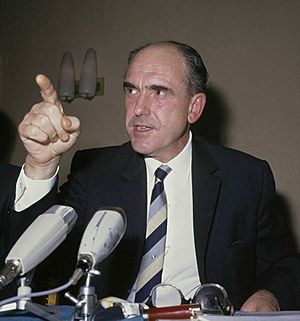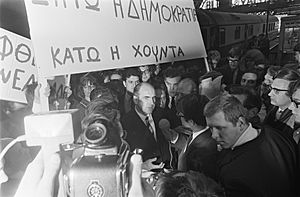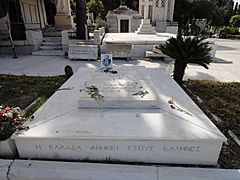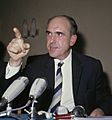Andreas Papandreou facts for kids
Quick facts for kids
Andreas Papandreou
Ανδρέας Παπανδρέου |
|
|---|---|
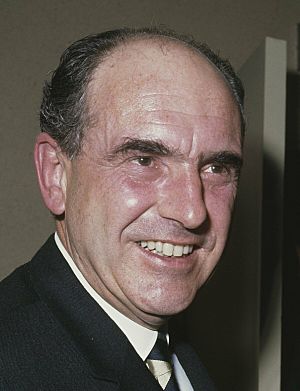
Papandreou in 1968
|
|
| Prime Minister of Greece | |
| In office 13 October 1993 – 17 January 1996 |
|
| President | Konstantinos Karamanlis Kostis Stephanopoulos |
| Preceded by | Konstantinos Mitsotakis |
| Succeeded by | Costas Simitis |
| In office 21 October 1981 – 2 July 1989 |
|
| President | Konstantinos Karamanlis Christos Sartzetakis |
| Preceded by | Giorgos Rallis |
| Succeeded by | Tzannis Tzannetakis |
| Leader of the Opposition | |
| In office 11 April 1990 – 13 October 1993 |
|
| Preceded by | Vacant |
| Succeeded by | Miltiadis Evert |
| In office 12 October 1989 – 23 November 1989 |
|
| Preceded by | Konstantinos Mitsotakis |
| Succeeded by | Vacant |
| In office 28 November 1977 – 21 October 1981 |
|
| Preceded by | Giorgos Mavros |
| Succeeded by | Giorgos Rallis |
| President of the Panhellenic Socialist Movement | |
| In office 3 September 1974 – 23 June 1996 |
|
| Preceded by | Position established |
| Succeeded by | Costas Simitis |
| Member of the Hellenic Parliament | |
| In office 17 November 1974 – 23 June 1996 |
|
| In office 16 February 1964 – 21 April 1967 |
|
| Monarch | |
| Personal details | |
| Born |
Andreas Papandreou
5 February 1919 Chios, Greece |
| Died | 23 June 1996 (aged 77) Athens, Greece |
| Citizenship |
|
| Political party | Panhellenic Socialist Movement |
| Spouses | Christina Rasia (1941–1951) Margaret Chant (1951–1989) Dimitra Liani (1989–1996) |
| Children | George Sofia Nikos Andrikos Emilia |
| Parents |
|
| Alma mater | University of Athens Harvard University |
| Signature | |
| Website | ANDREAS G. PAPANDREOU Foundation |
| Military service | |
| Branch/service | United States Navy |
Andreas Georgiou Papandreou (Greek: Ανδρέας Γεωργίου Παπανδρέου; 5 February 1919 – 23 June 1996) was a very important Greek politician and economist. He founded a major political party called PASOK and led it from 1974 to 1996. He served as the prime minister of Greece three times.
Papandreou's party winning the election in 1981 was a big moment for Greece. It was the first time a government with a strong socialist plan was elected. During his time as prime minister, from 1981 to 1989, his governments did many important things. They officially recognized groups that fought against the Axis occupation during World War II. They also created the National Health System, making healthcare more available to everyone.
His government also improved workers' rights and strengthened the power of the Greek parliament. They allowed Greek refugees from the Greek Civil War to return home. Papandreou's party, PASOK, was the first non-communist party in Greece that had a large number of members. This meant more people got involved in politics and society. In a 2007 poll, many Greeks called Papandreou the "most important Greek Prime Minister." Both his father, Georgios Papandreou, and his son, George Papandreou, also became Prime Ministers of Greece.
Contents
Early Life and Education
Andreas Papandreou was born on the island of Chios, Greece. His father, Georgios Papandreou, was a Greek politician who later became prime minister. His mother, Sofia Mineyko, had Polish and Lithuanian family roots. Before university, Andreas went to Athens College, a private school.
He studied at the National and Kapodistrian University of Athens for a short time. In 1938, during a strict government period, he was arrested for his political beliefs. After his father helped him, he was allowed to leave Greece and go to the United States.
In 1943, Papandreou earned a PhD in economics from Harvard University. After his studies, he helped with America's war efforts during World War II. He worked for the US Navy, helping with warship repairs and caring for wounded soldiers. He later became a professor at several universities in the US, Sweden, and Canada.
Family Life
Andreas Papandreou was married three times. His first marriage was to Christina Rasia from 1941 to 1951. In 1951, he married Margaret Chant, and they had three sons and a daughter. He also had another daughter, Emilia, born in Sweden.
In 1989, he divorced Margaret and married Dimitra Liani. He passed away in 1996.
Political Journey
Papandreou came back to Greece in 1959. He was invited by Prime Minister Konstantinos Karamanlis to lead a program about economic development. In 1960, he became a director at the Athens Economic Research Center and an advisor to the Bank of Greece.
In 1963, his father, George Papandreou, became prime minister. Andreas became his main economic advisor. He gave up his American citizenship and was elected to the Greek Parliament in 1964. He quickly became a minister, almost like an assistant prime minister.
Papandreou believed Greece should be more independent from other countries, especially the United States. He also wanted to remove military officers who were against democracy. He disagreed with American policies on the Cyprus dispute.
In 1965, there were political disagreements in Greece. This led to a period of instability. It ended with a military takeover in April 1967.
When the military government took power, Andreas Papandreou was put in prison. Under pressure from academics and thinkers, the military government released him. He then moved to Sweden with his family. While living outside Greece, Papandreou created an organization called the Panhellenic Liberation Movement (PAK). This group worked against the Greek military government. He traveled around the world, gathering support against the regime.
Papandreou returned to Greece in 1974 after the military government fell. He was offered the leadership of his father's old party. However, he decided to start a new, more "radical" party called the Panhellenic Socialist Movement (PASOK). Many of his friends from PAK joined this new party.
In the 1974 elections, PASOK received 13.5% of the votes. But in 1977, they got 25%, and Papandreou became the leader of the opposition.
The "Change" in Government
In the 1981 elections, PASOK won a huge victory. Papandreou became Greece's first socialist prime minister. The party's main slogan was Allagí, which means "change."
Once in office, Papandreou adjusted some of his earlier promises. Greece did not leave NATO or the European Economic Community. He was very good at getting financial help for Greece. In Greece, his government immediately started a big program to help people. They increased benefits for unemployed people and those with lower wages. Pensions and minimum wages also went up.
His government made many changes to social policies. They created a welfare system and greatly expanded healthcare coverage. The "National Health System" brought modern medical care to rural areas for the first time. They also helped lower-income families go on state-supported vacations. Workers' rights improved, and refugees from the Civil War were allowed to return home. He also officially recognized the groups that fought against the Axis occupation during World War II.
Other reforms included changes to trade union rights, social security, and education. A fairer tax system was introduced, and more money was given to arts and culture. Benefits were provided for people with disabilities, and minimum pensions were linked to the minimum wage. Special family allowances were created for single mothers and children whose fathers were not present. Wages and pensions were adjusted regularly based on price increases. Women with children could retire earlier, and low-income families received housing help.
Papandreou's government also introduced new laws that made it easier to get a divorce and improved the legal rights of women. For example, in 1984, women were guaranteed equal pay for equal work. He also made changes to the Greek education system, allowing students to have a say in choosing their professors. The university system grew, with the number of students doubling between 1981 and 1986.
In a move that the Church of Greece strongly opposed, Papandreou introduced civil marriage for the first time in Greece. Before this, only marriages performed by the Church were legally recognized.
A big part of Papandreou's "change" was to reduce the power of the "old families" who had controlled Greek politics and economy for a long time.
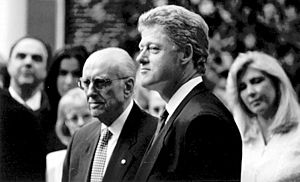
Papandreou was re-elected in 1985. He gained more popularity in 1987 during a disagreement with Turkey in the Aegean Sea, where he showed strong leadership.
Economic Policies
Some critics say that Papandreou's government spent too much money from 1981 to 1990. They argue that this spending was not matched by enough income, which led to bigger budget deficits and public debt. They believe that many economic indicators got worse during this time.
However, his supporters say his policies were successful. They argue that his government greatly increased the buying power of most Greeks. Personal incomes grew by 26% during the 1980s. They believe that the increased spending in his early years was needed to help Greek society heal after the Civil War. They also say that his governments managed inflation and unemployment and kept the economy growing.
International Relations
Papandreou was praised for leading an independent foreign policy. He made Greece more important on the international stage. In 1982, he helped start a movement called the Initiative of the Six. This group included leaders from Mexico, Argentina, Sweden, Tanzania, and India. Their goal was to promote peace and progress worldwide. They tried to get the United States and the Soviet Union to stop nuclear testing and reduce nuclear weapons.
Papandreou sometimes spoke strongly against the United States. He was the first Western prime minister to visit General Wojciech Jaruzelski in Poland. He believed that the Soviet Union helped limit the spread of capitalism. This stance made him very popular in Greece, as many Greeks felt previous governments were too loyal to US interests.
Papandreou's government was the first in post-war Greece to set its own defense policy. This was based on Greece's own security needs, not those of other countries. He supported various movements around the world that were fighting for their freedom. He also supported the Palestinian cause, meeting with PLO chairman Yasser Arafat and speaking out against Israeli policies. He believed in a two-state solution for the conflict.
Papandreou's Public Image
Both his supporters and opponents often called Papandreou simply "Andreas." This was unique in Greek politics and showed how popular and charismatic he was. Andreas was also known for wearing turtleneck sweaters with his suits instead of a traditional shirt and tie. This became a big fashion trend, especially among his supporters. His first appearance in Parliament with a black turtleneck caused a stir, but it only added to his popularity.
His Legacy
Papandreou made Greece's foreign policy more independent. He showed that Greece could set its own goals, both inside and outside the country, without being controlled by foreign powers.
Some of his critics on the left, like the Communist Party of Greece, said that in reality, he still supported the goals of NATO and the United States.
Andreas Papandreou is widely recognized for changing Greek politics. He shifted power away from the traditional conservative parties that had ruled for decades. He brought more populist and centre-left ideas into play. This helped heal some of the old wounds from the Civil War. Greece became more open and similar to other Western European countries. Papandreou also worked to include many social classes that had been left out of society and the economy after the Civil War.
It is also agreed that Papandreou, along with Karamanlis, played a key role in bringing democracy back to Greece. He is seen as a careful and realistic leader, even though he appeared to be a strong leftist. His decision to keep Greece in the European Union and NATO, which he had strongly opposed for years, showed his practical approach. Even his talks about removing US military bases from Greece were handled skillfully. This helped create common goals for different political groups in Greece. His ability to say "no" to the Americans publicly gave Greeks a feeling of national independence and pride.
Perhaps his most important achievement was creating political equality among Greeks. During his time in power, those who had lost the Civil War were no longer treated as second-class citizens. This helped Greece remember and value an important part of its history.
Papandreou's son, George Papandreou, later became the leader of PASOK and prime minister. A common chant among PASOK supporters at rallies is "Andreas, you are still alive! You're leading us!"
In polls conducted in 2007 and 2010, Andreas Papandreou was voted as the best prime minister of Greece since democracy was restored in 1974.
Works
- Economics and the social sciences, Economic Journal, 1950
- Competition and its regulation, Prentice-Hall, 1954
- Economics as a Science, Lippincott, 1958
- A Strategy for Greek Economic Development, Center of Economic Research, 1962
- Democracy and National Rebirth, Fexis, Athens, 1966
- Man's freedom, Columbia University Press, New York, 1970
- Democracy at gunpoint: The Greek Front (I Dimokratia sto apospasma), Doubleday & Co., New York, 1970
- Paternalistic Capitalism, The University of Minnesota Press, 1972
- Greece to the Greeks, Athens, 1976
- Transition to Socialism, Athens, 1977
Awards and Honors
 Knight Grand Cross of the Order of Isabella the Catholic (1983)
Knight Grand Cross of the Order of Isabella the Catholic (1983) Star of People's Friendship (1985)
Star of People's Friendship (1985) Order of the Polar Star (1999)
Order of the Polar Star (1999)
Images for kids
See Also
 In Spanish: Andreas Papandréu para niños
In Spanish: Andreas Papandréu para niños
 | Delilah Pierce |
 | Gordon Parks |
 | Augusta Savage |
 | Charles Ethan Porter |


